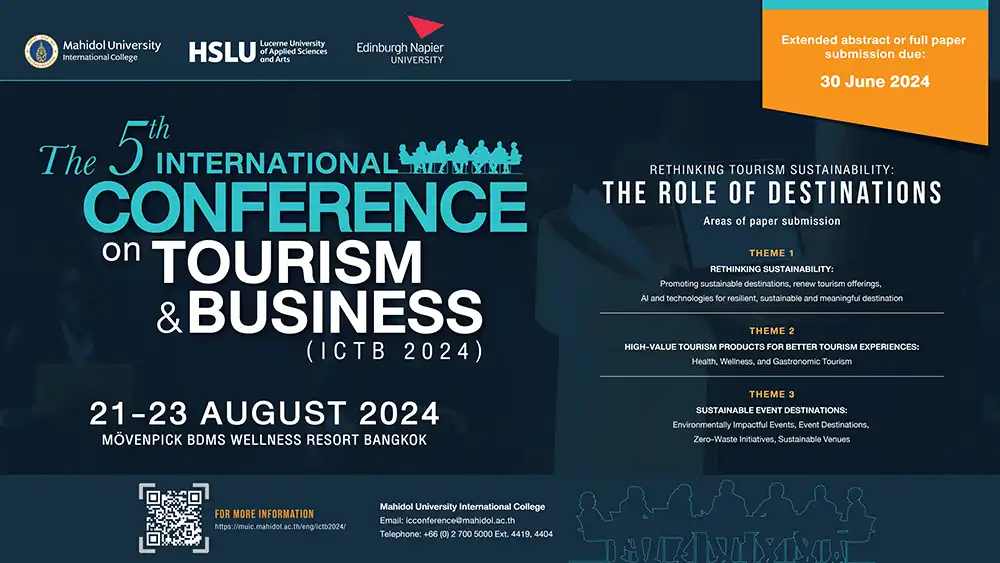Please choose a news and article category.
Recent MUIC Events
Join Us in “MUIC Open Days 2024: Who Am I?”
9:00 am - 4:00 pm
Journalism in Thailand: Career Opportunities and Challenges
10:00 am - 1:00 pm
Special Talk on Foreign Policy of Peru and Peru-Thailand Relations
2:00 pm - 4:00 pm
MUIC 360 Degrees
Tips for Freshmen (Ep.1)
May 8, 2024 2024-05-08 6:55Tips for Freshmen (Ep.1)
The 3rd Trimester has already started, with Mahidol University International College’s (MUIC) new freshmen still adjusting to college life and their new academic environment.
Experience, as they say, is the best teacher, but it would be great if there are also some practical pieces of advice from upperclassmen. In this two-part article, several students were asked to offer useful tips to this trimester’s freshmen.
Munazza “Bunny” Munabir

Senior CDP Student
Teaching Assistant (Typography, Typeface Design and 2D Principles)
- Participate in whatever activity you find interesting. You will find yourself learning new experiences and from that, you will know what you like and dislike.

- Do what you need to do. Your assignments are your duty. As a student, it’s a role. You do not learn everything from your class. I learnt most of my life lessons outside the classroom. Do what your heart says. Calligraphy is my obsession. Ajarns recognized it and have asked me to become a teaching assistant. I repeat: Do what you love to the fullest.
- Ajarns at MUIC are like my second mom and dad. They are the kindest. Never hesitate to ask them for help. They are always ready to assist you to improve your skills.
- Balance everything out. Prioritize your work. Always remind yourself that exams and projects come first. Activities at MUIC might be sooo fun but you should also keep in mind your duties.
- Grades do not matter as much as your skills. I aim for straight A every term. Every term I pressure myself, ignoring my health, in order to achieve 4.0. Now that I’m on my 4th year, I realized that it’s OK not to have a perfect grade. You know why? Because if you get A, it means you are satisfied with it and think you are good. Grade is just a letter to showcase your hard work but not your skills. You may get a 4.0 GPA with honors but not an A+++ no# 1 career path! It’s you, not your grades, which will bring you to places.
Jiratt “Boom” Pluemthanom

Sophomore IRGA Student
President, MUN Club
Spokesperson, IRGA Ambassadors
Tip 1: Plan Your Trimesters
- Make a course schedule: This will help you visualize your academic journey throughout college. List the courses you need to take, the number of credits each course is worth, and the trimesters they are offered.
- Consider course difficulty and workload: Balance your schedule with a mix of more manageable and more challenging courses. This will help you avoid getting overwhelmed during terms with heavy workloads.
- Factor in extracurricular activities: When planning your schedule, consider the time commitment required for any extracurricular activities you plan to participate in.
- Choose courses that interest you: You’re more likely to be engaged and learn more in courses that pique your curiosity.
- Consider how the courses fit your career goals: Explore courses that are relevant to your desired career path. The knowledge and skills you gain from these courses will be valuable in the future.

Tip 3: Get Involved in Extracurricular Activities
- Explore your interests: Universities offer a wide variety of clubs and organizations. Joining one (or more!) is a great way to find people who share your interests.
- Develop new skills: Extracurricular activities can help you develop communication, teamwork, and leadership skills that are valuable in both your academic and professional life.
- Network and make friends: Getting involved in campus activities is a great way to meet new people and build friendships.
- Maintain a healthy lifestyle: Eat nutritious foods, sleep well, and exercise regularly. Taking care of your physical health will give you the energy you need to succeed in your studies.
- Manage stress: College can be stressful. Find healthy ways to manage stress, such as relaxation techniques or talking to a friend or counselor.
- Seek help when needed: Don’t be afraid to seek help if you’re struggling with your mental or physical health. MUIC also offers counseling services and other support resources.
- Create a Schedule: Plan your week by blocking out time for classes, study sessions, meals, sleep, extracurricular activities, and relaxation. Use a planner, calendar app, or bullet journal to keep track of your commitments.
- Learn to Say No: If you’re overloaded, don’t hesitate to decline invitations or requests. It’s okay to prioritize your well-being and academic responsibilities.
- Be Flexible: Unexpected events can arise. Learn to adapt your schedule and adjust deadlines while prioritizing essential tasks.
Such wise—and also practical—words from two successful MUIC students.
Hopefully, freshmen would consider their pieces of advice seriously and apply them in their daily life. After all, it doesn’t hurt to learn from other people’s experience.
Related Posts
Essay-writing Tips You’ll Find Useful in College
May 15, 2024
531 views
How to Organize a Student Club Activity
May 03, 2024
155 views
Staying Safe from PM 2.5
Apr 18, 2024
181 views
Irish Exchange Student Lists 3 Best Things about MUIC
Apr 02, 2024
282 views
ICIC’s National Costume Parade Promotes Respect for Other Cultures
Mar 15, 2024
356 views












